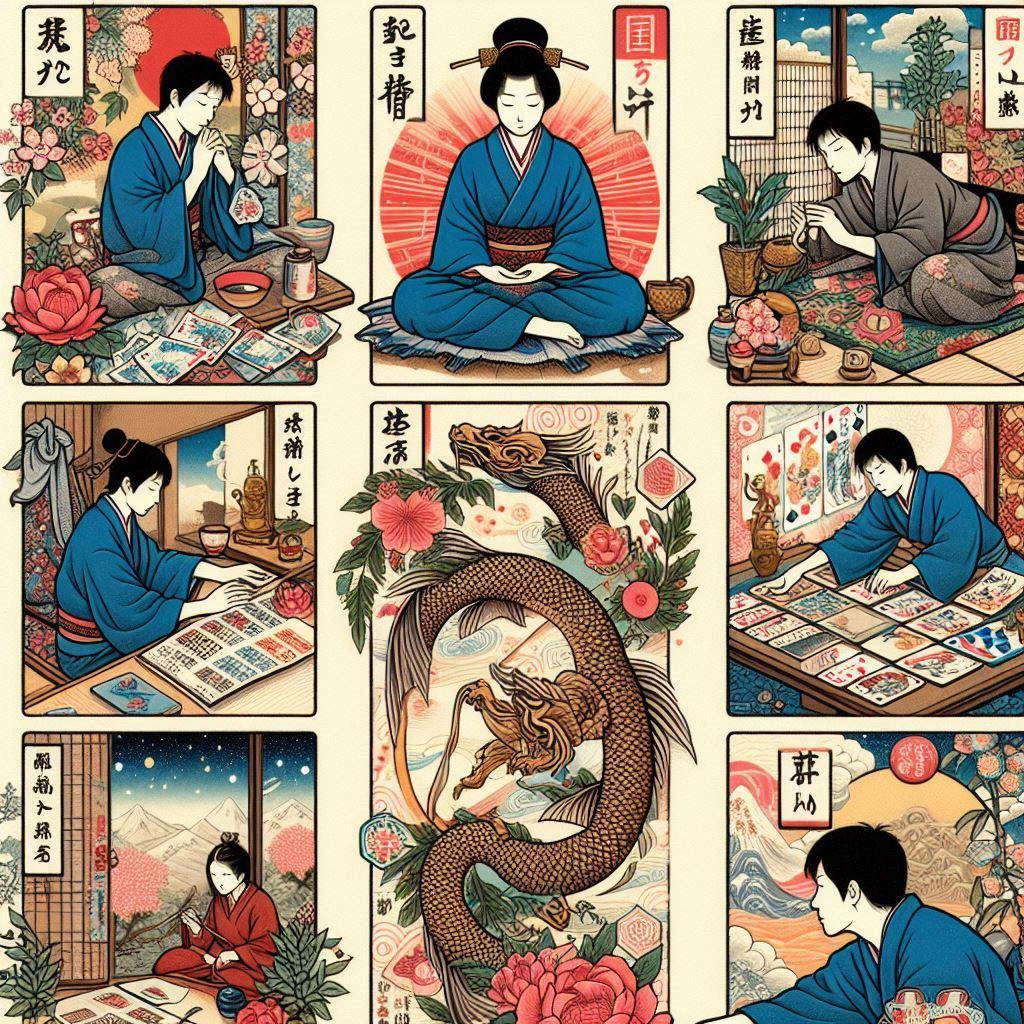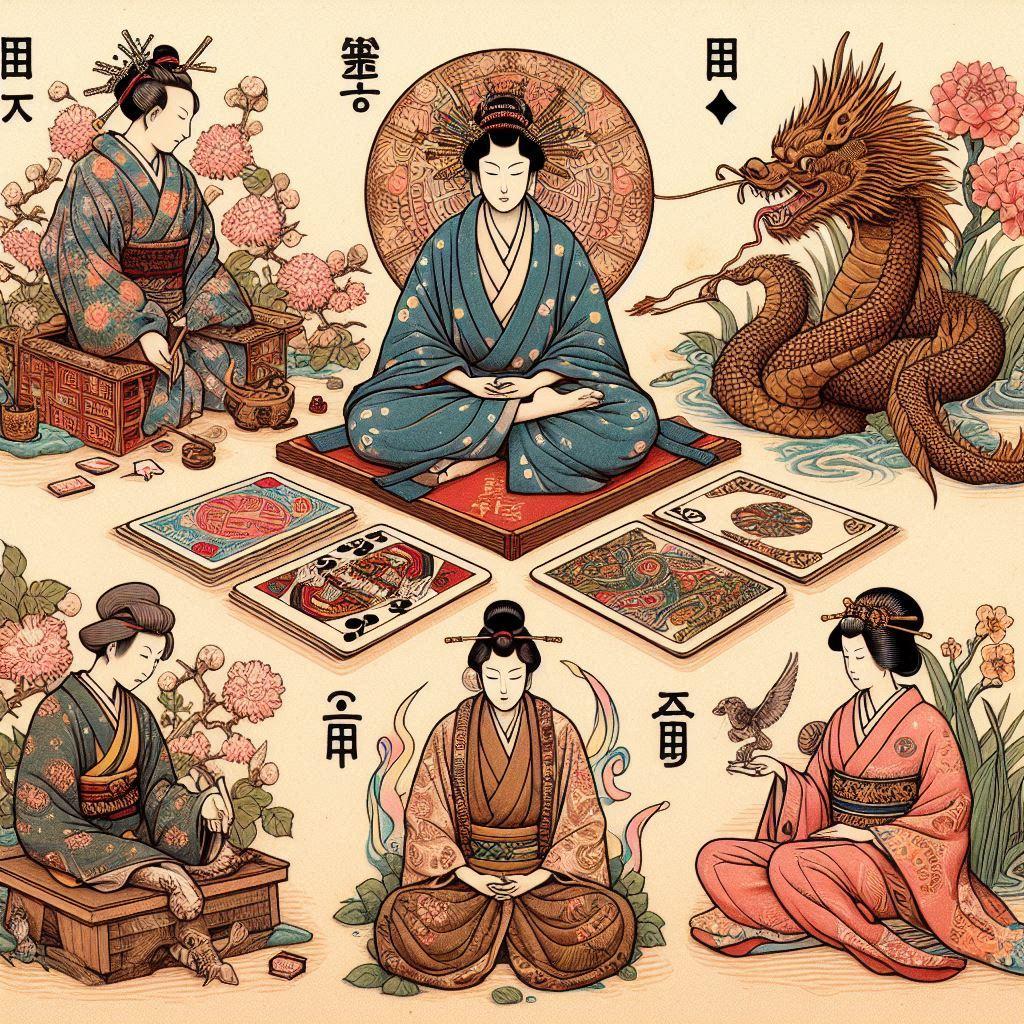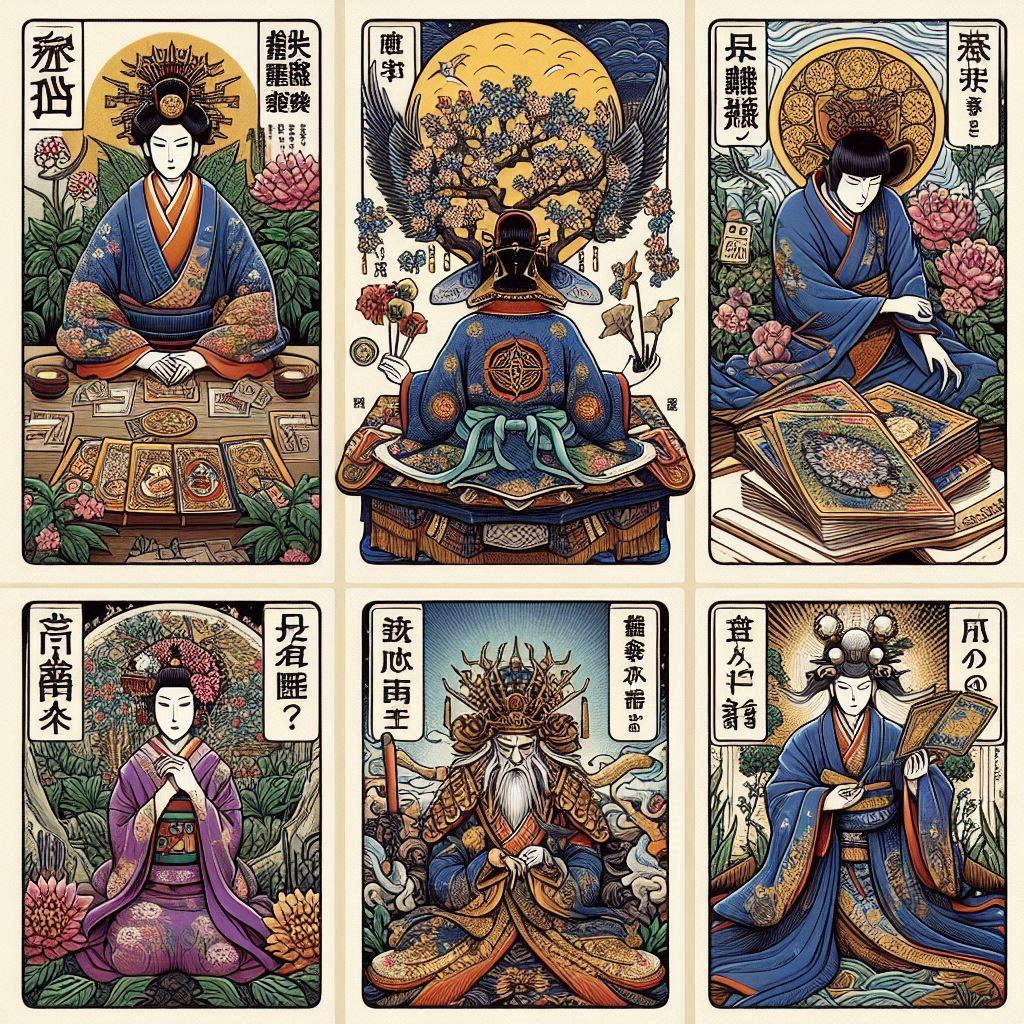Ikigai is a Japanese concept that helps individuals find meaning and purpose in life by combining what they love, what they are good at, what the world needs, and what can bring them income. The Hanafuda cards, with their rich symbolism of nature and the seasons, serve as an ideal metaphor for finding one’s ikigai. Each card reflects a unique aspect of life and its cycles, just as your ikigai is unique and reflects your life path and goals. Ikigai is closely tied to the philosophy of wabi-sabi, which values imperfection, simplicity, and the acceptance of the natural flow of time. Wabi-sabi teaches us to find beauty and joy in everyday activities, to accept life as it is, with all its challenging but essential moments. This philosophy can guide you in your search for ikigai, helping you appreciate every moment and find joy in each day.

Meditative Reading:
Choosing Cards: Select 1 to 9 cards, intuitively focusing on those that attract you. Each selected card can symbolize different aspects of your life and serve as a guide to understanding and finding your ikigai.
- How do the selected cards help me understand my life goals? Reflect on each card in the context of what it might symbolize for you. Consider what goals resonate with you and how they relate to the images and symbols on the cards.
- How does each card reflect my unique path and destiny? Hanafuda cards may reflect your past experiences, talents, or aspirations. Analyze how these elements can assist you in finding the path that aligns with your ikigai.
- Which elements of the cards indicate joy and meaning in my daily life? Wabi-sabi teaches us to find joy in simple things. Look at the cards and think about which elements of the images remind you of what brings joy and satisfaction in everyday life. It could be the reflection of nature, flowers, or other symbols that suggest how to enjoy life and find meaning in each moment.
Practical Application of the Ikigai Technique:
To find your ikigai, answer four key questions that will help you uncover your life’s purpose:
- What do I love to do? Ask yourself what inspires you, what brings joy and satisfaction. It could be something that ignites deep passion within you or something you engage in during your free time.
- What am I good at? Think about your skills, talents, and strengths. What do you excel at? It could be something you do at a professional level or something you perform effortlessly and with pleasure.
- What does the world need? This question helps you understand how your passions and skills can be of service to others. Consider how you can contribute to society or the world based on your abilities.
- What can bring me income? Consider how your passions and abilities can become a source of income. Can what you love to do become your profession or business?
Integrating Cards into the Ikigai Process: Using Hanafuda cards in the process of finding your ikigai, you can visualize and structure your thoughts. Each card can represent one of these questions or aspects of your life. Through meditating on the selected cards and contemplating their meanings, you can gain a deeper understanding of your life priorities and find harmony between all aspects of life, leading you to the realization of your ikigai.
4. The 5S Methodology
The 5S methodology, which originated in Japan, is a system for organizing and maintaining order in the workplace, encompassing five stages: Sort (Seiri), Set in Order (Seiton), Shine (Seiso), Standardize (Seiketsu), and Sustain (Shitsuke). These principles are closely related to the Japanese philosophy of wabi-sabi, which values simplicity, functionality, and the natural beauty of things.
Hanafuda, with its elegant design and symbolism of natural cycles, reflects the order and cleanliness inherent in Japanese culture. Each card is not just decorated but organized in a way that its symbols convey harmony and meaning. The 5S methodology, aimed at creating order and functionality, can also be applied in personal life, much like how Hanafuda cards organize and structure the symbols of nature.
Meditative Reading:
Choosing Cards: Select 1 to 9 cards, focusing on those that visually attract your attention or seem the most orderly and structured. These cards may reflect areas of your life that require order and structure or may suggest where you need to focus on optimization and simplicity.
- How do the cards inspire me to bring order to my life and space? Look at the selected cards and think about how their symbols and images might motivate you to organize and cleanse your life space. What exactly on the cards prompts you to take action to establish order?
- What elements of order and cleanliness reflected in the cards can I transfer to my life? Pay attention to the details and elements of the cards associated with cleanliness, simplicity, and orderliness. How can these elements be reflected in your home, workplace, or even in your thoughts and actions?
- How do the cards suggest areas of my life that need simplification and optimization? The cards can serve as symbols of the aspects of your life that require simplification or reorganization. Think about which elements on the cards point to areas where you can reduce excess, improve functionality, and make your life more structured and harmonious.
Practical Application of the 5S Methodology:
- Sort (Seiri): Start by separating necessary items from unnecessary ones. At home, this could mean cleaning out closets, and at work, organizing documents and tools. It is essential to keep only what is truly necessary.
- Set in Order (Seiton): Arrange things in their proper places so they are easily accessible and organized. Everything should have its place, and everything should be in its place. For example, organize kitchen utensils so they are convenient to use.
- Shine (Seiso): Regularly maintain cleanliness and order. This applies not only to physical space but also to your mental and emotional state. Take time to refresh your workspace, home, and mind.
- Standardize (Seiketsu): Create standards and habits for maintaining order. This might include daily or weekly cleaning and organizing rituals to maintain the achieved order.
- Sustain (Shitsuke): Continuously strive for process improvement. The 5S system requires continuous improvement so that order and cleanliness become a part of your life. Regularly review and improve your organization methods.
Integrating Cards into the 5S Process: Using Hanafuda cards for meditative reading, you can be inspired by their structure and symbolism to better organize your space and life. Each card can symbolize one of the 5S stages or an aspect of your life that requires organization. Meditate on the cards and use them as a guide to create a more organized, simple, and harmonious living space following the principles of the 5S methodology.


